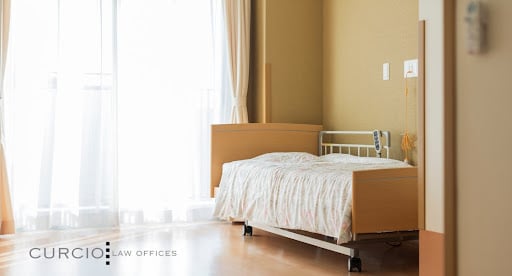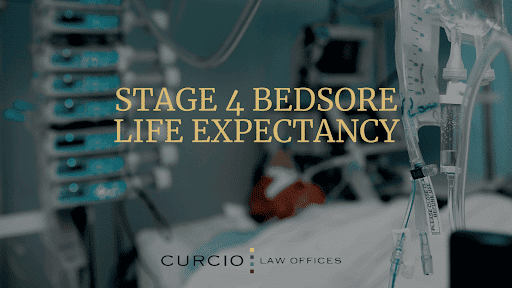Sadly, nursing home abuse happens far more frequently than any family would like to think about. The National Health Institute stresses the importance of treating pressure sores in the initial stages for the best possible outcome. Health reports share that the average stage 4 bedsore life expectancy is a few short months, if that.
Most health care providers in nursing homes don’t mean to purposefully cause their elderly patients pain. However, for some elderly nursing home residents and hospital patients, failure to receive proper treatment is, unfortunately, a direct act of elder abuse, which can cause life-threatening complications.
While some pressure ulcers occur without negligence being a factor, stage 4 bedsores don’t show up overnight. If treated properly, healthcare professionals can prevent bedsores from progressing to more aggressive stages. So, when a nursing home resident presents with a stage 4 bedsore in Chicago, more often than not, nursing home abuse or neglect is to blame.
If you suspect negligence within a Chicago nursing home, don’t wait. Seek professional medical advice, then call 312-321-1111 to speak with an experienced Chicago nursing home abuse lawyer at Curcio & Casciato. We offer an initial free legal case review.
What are Bedsores or Pressure Ulcers?
Bed sores, also known as pressure ulcers and decubitus ulcers, are deep tissue injuries under the skin. The pressure injuries are usually triggered by a lack of blood flow from immobility. Failure to change positions causes pressure to the skin. This constant pressure causes a lack of blood supply. When the blood flow can no longer reach the muscles or the deeper tissues within the body, tissue can begin to die and cause infection.
What is a Stage 4 Bedsore?
Stage 4 bedsores, also called pressure sores or pressure ulcers, are pressure injuries that begin on the skin’s surface. After a prolonged period, if medical care isn’t administered, these pressure sores become worse and more dangerous in nature. Any type of open sore or large wound that doesn’t receive medical care in the earlier stages can lead to a serious infection.
A stage 4 bedsore is a deep wound that reaches the patient’s muscles, ligaments, or even bones.
Patients that develop bedsores require immediate medical care. When this care isn’t provided, the pressure ulcers can cause excruciating pain. Stage 4 bedsores also typically lead to infection, surgeries, or even death.
Johns Hopkins Medicine & the National Center for Health Statistics highlight the importance of thorough checks for nursing home residents. Although bed sores are mainly found in bony areas, such as the shoulder blades, tailbone, heels, hips, and ankles, this pressure injury can occur any place where the skin has one of the four stages of untreated bedsores.
Assisted living facilities and nursing homes can’t always prevent stage 1 pressure ulcers from developing. However, a Chicago nursing home can be held liable for damages when a pressure sore appears and healthcare professionals take no action to prevent it from turning into a stage 3 or 4 bed sore.
What Causes Stage 4 Bedsores?

Pressure ulcers are usually caused by a prolonged period of limited movement. Extended time and pressure without treatment are generally what cause pressure ulcers to advance to stage 4 injuries.
Developing bedsores are categorized by 4 stages.
In stage 1, pressure ulcers cause the affected area to turn red and the skin may feel warm. Stage 1 bed sores also are painful to the touch.
As the pressure continues, the skin’s surface layers start to die off from a lack of blood supply. When the affected area changes from reddened skin to an open wound, a pressure ulcer is then in the stage 2 category.
In stage 3, the wound becomes deeper as the tissue beneath the skin begins to die. If a person doesn’t receive medical treatment immediately in this stage, they may not be able to heal completely.
Stage 4 bedsores are associated with large scale tissue loss. Serious complications arise from every stage 4 bedsore. These complications can include gangrene, osteomyelitis, sepsis, or death.
What Do Stage 4 Bedsores Look Like?
Pressure ulcers or bed sores look different at each of the stages. Most of the time, stage 1 or 2 bedsores resemble bruising with a small wound. However, once a patient reaches the advanced, stage 4 bedsore stage, the pressure ulcers start to resemble a red crater with a blackened tone in skin color. This particular tone of coloring is a result of the prolonged pressure restricting blood flow, causing the tissue to die. The dead tissue surrounding the bed sores may also appear yellow or darker in color.
Deeper tissues, muscles, tendons, or bones become visible in most patients with a stage 4 bedsore injury. Their open wound may also excrete drainage or pus.
Stage 4 bedsores will differ in appearance, based on where they’re located on the body. Areas with more tissue, such as the buttocks, may not show as much bone. Nevertheless, once a bed sore reaches an advanced stage, it can be deadly.
Medical Treatment for Stage 4 Pressure Ulcers
Nursing home residents diagnosed with a stage 4 bedsore will need prompt medical treatment outside the nursing home facility. The factors surrounding an individual’s underlying health conditions will also determine the proper medical treatment needed to eliminate the risk of infection, as stage 4 bedsores can be a death sentence for the elderly.
Treatment for stage 4 bedsores include:
- Antibiotics in order to treat the infection
- Debridement, which is removing any infected or dead tissue from the bedsore
- Surgical skin grafts that cover the open wound with healthy skin, if possible
The healing process for a stage 4 bedsore can take anywhere from 3 months to 2 years, depending on the patient’s overall health.

Who is Most at Risk for Stage 4 Bedsores?
Nursing home residents with mobility issues and those with underlying health conditions, such as Alzheimer’s and dementia, are at a higher risk of developing pressure sores.
Also, this puts several nursing home residents at risk for stage 4 bedsores and other pressure injuries, especially when the assisted living facility is understaffed.
Those With Limited Mobility
The key to preventing a bedsore at any stage is mobility. So if an older person cannot move on their own, they may sit or lie in the same position for hours. The lack of movement can cut off their skin’s blood supply, causing a pressure ulcer or bed sore to develop.
When a person with limited mobility doesn’t have anyone to help them move around for days at a time, they are at an extremely high risk for developing a stage 4 bedsore.
Nursing Home Residents
According to Health Alberta, nursing home residents have a high risk for developing bed sores. Usually, poor nutrition and neglect play a huge role in nursing home abuse, leading to the initial formation of the bedsore or the progression to one of the advanced stages of pressure sores.
While understaffing in nursing homes is never an excuse for a patient to develop a stage 4 bedsore, it is one of the most prevalent causes for these types of injuries.
Those With Alzheimer’s or Dementia
Nursing home residents with mental impairments, such as Alzheimer’s or dementia, that develop bedsores might not be able to tell anyone about their pain due to their mental health condition. Additionally, these residents may also have trouble sensing pain or discomfort.
Can Bedsores Cause Death?
Stage 4 bedsores cause death every single day in this country. Once a person develops an open wound, this area serves as an open invitation for bacteria and infection.
If the bacteria and infection aren’t properly treated, this infection leads to sepsis or septic shock, eventually followed by organ failure and death.
A stage 4 bedsore doesn’t always have to end in death. However, since the risk factors exist, medical professionals must be consistent with providing prompt treatment including: proper nutrition, wound treatment, and relieving pressure so that the bedsores don’t lead to deadly complications.
Since a stage 4 bedsore is an obvious sign of elder abuse or nursing home negligence in most cases, families who are helping a loved one recover from a stage 4 bedsore really shouldn’t intrust this care to the facility that caused it. Your family may be eligible for financial compensation to cover healthcare costs associated with your loved ones present and future bedsores treatment.
If your elderly loved one suffered major health consequences or death from a stage 4 bedsore, let our Chicago wrongful death attorneys’ take legal action on their behalf. Call Curcio & Casciato at 312-321-1111 for a free consultation with a free case review. Our Illinois-based law firm has years of experience litigating on behalf of those who are victims of nursing home abuse or neglect.
How Do You Prove That a Bedsore Caused Death?
If a family wants to pursue legal action in Chicago, their lawyer must not only prove that the nursing home’s negligence caused the bedsore, but also that the stage 4 bedsores are what ultimately killed their loved one. In legal terms, the stage 4 bedsore must be the actual cause of their passing.
Many elderly patients may have stage 4 bedsores but pass away from other causes, such as terminal illnesses. So having sufficient evidence to link the stage 4 bedsore to the death is critical for a favorable case outcome.
Examples of evidence that nursing home neglect caused the stage 4 bedsores and that those bedsores ultimately led to the demise of a loved one can include:
- A death certificate where the cause of death is attributed to the bedsores
- An autopsy report that confirms that the stage 4 bedsore was the cause of death
- Expert testimony of a medical physician with extensive experience in treating pressure sores
- Lab results showcasing how the infection caused the body to shut down due to septic shock
Additionally, many families are told that their loved ones did not pass away because of nursing home neglect. That the suspected injuries were simply Kennedy Ulcers, a natural part of death. If you’ve been told your loved one had a Kennedy ulcer in a Chicago nursing home, contact our lawyers. We have extensive experience in nursing home bedsore lawsuits. We can help put your mind at ease or fold the negligent care center accountable, all without a single upfront cost to you or your loved one.

Can You Sue a Chicago Nursing Home for a Bedsore Death?
If your loved one died from lack of proper treatment in a nursing home or assisted living facility, you can sue the facility for nursing home neglect or wrongful death. Furthermore, any other entities associated with the nursing home may also be liable for damages. These may include shell corporations, corporate offices, management companies, third party employment agencies, etc. Individuals who contributed to the untreated bed sores that caused your loved one’s death may also be held liable in Chicago. These individuals can include the owner, director, or administrator of the nursing home.
You may sue on behalf of your loved one’s estate for personal injury, as well as yourself for wrongful death.
Your loved one’s estate could be entitled to recover all damages for an extended period of pain and suffering, medical bills associated with the bedsores including any attempted life saving medical treatments, funeral or burial expenses, back pay for nursing home stay, etc.
The wrongful death claimants may be entitled for compensation for the loss of life of their loved one.
Experienced Chicago Nursing Home Abuse Lawyers
If you believe that your loved one is a victim of Chicago nursing home neglect or abuse, don’t wait until they suffer from stage 4 bedsores or life threatening infections to reach out. For older adults, health conditions can change rapidly. Seek medical assistance as soon as possible for your loved one. Figure out which of the pressure ulcer sore stages he or she is suffering from. Then, call our experienced Chicago nursing home bedsore lawyers.
All case information is protected through an attorney client relationship. You won’t put your loved one at risk by calling our offices. Your loved one deserves legal help, and our law firm provides a completely free legal case review so that we can provide a fair assessment of your loved one’s potential nursing home abuse case.
The experienced Chicago nursing home abuse lawyers understand the time it takes for a pressure ulcer to develop into a life threatening injury. You will need help proving that if the nursing home had demonstrated proper care for preventing bedsores from advancing, your loved one would still be here. Our experienced and compassionate lawyers can help.
Call Curcio & Casciato at 312-321-1111 for a free legal case review.



